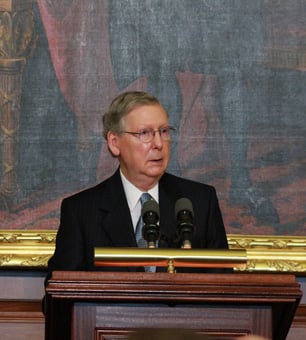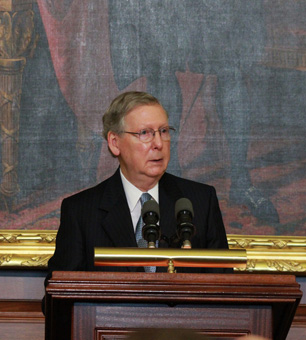Truthout combats corporatization by bringing you trustworthy news: click here to join the effort.
 Senate Minority Leader Mitch McConnell. (Photo: Talk Radio News Service / Flickr)Washington – At the urging of President Obama, the Democratic and Republican leaders of the Senate set to work Friday night to assemble a last-minute tax deal that could pass both chambers of Congress and avert large tax increases and budget cuts next year, or at least stop the worst of the economic punch from landing beginning Jan. 1.
Senate Minority Leader Mitch McConnell. (Photo: Talk Radio News Service / Flickr)Washington – At the urging of President Obama, the Democratic and Republican leaders of the Senate set to work Friday night to assemble a last-minute tax deal that could pass both chambers of Congress and avert large tax increases and budget cuts next year, or at least stop the worst of the economic punch from landing beginning Jan. 1.
After weeks of fruitless negotiations between the president and Speaker John A. Boehner, Mr. Obama turned to Senator Harry Reid, the majority leader, and Senator Mitch McConnell of Kentucky, the Republican leader — two men who have been fighting for dominance of the Senate for years — to find a solution. The speaker, once seen as the linchpin for any agreement, essentially ceded final control to the Senate and said the House would act on whatever the Senate could produce.
“The hour for immediate action is here. It is now,” Mr. Obama said in the White House briefing room after an hourlong meeting with the two Senate leaders, Mr. Boehner and Representative Nancy Pelosi, the House Democratic leader. He added, “The American people are not going to have any patience for a politically self-inflicted wound to our economy, not right now.”
Senate Democrats want Mr. McConnell to propose an alternative to Mr. Obama’s final offer and present it to them in time for a compromise bill to reach the Senate floor on Monday and be sent to the House. Absent a bipartisan deal, Mr. Reid said Friday night that he would accede to the president’s request to put to a vote on Monday Mr. Obama’s plan to extend tax cuts for all income below $250,000 a year and to renew expiring unemployment compensation for as many as two million people, essentially daring Republicans to block it and allow taxes to rise for most Americans.
Bipartisan agreement still hinged on the Senate leaders finding an income level above which taxes will rise on Jan. 1, most likely higher than Mr. Obama’s level of $250,000. Quiet negotiations between Senate and White House officials were already drifting up toward around $400,000 before Friday’s White House meeting. The two sides were also apart on where to set taxes on inherited estates.
But senators broke from a long huddle on the Senate floor with Mr. McConnell on Friday night to say they were more optimistic that a deal was within reach. Mr. McConnell, White House aides and Mr. Reid were to continue talks on Saturday, aiming for a breakthrough as soon as Sunday.
“We’re working with the White House, and hopefully we’ll come up with something we can recommend to our respective caucuses,” said Mr. McConnell, who has played a central role in cutting similar bipartisan deals in the past.
The emerging path to a possible resolution, at least on Friday, appeared to mirror the end of the protracted stalemate over the payroll tax last year. In that conflict, House Republicans refused to go along with a short-term extension of the cut, but Mr. McConnell reached an agreement that permitted such a measure to get through the Senate, and the House speaker essentially forced members to accept it from afar, after they had left for Christmas recess.
This time, the consequences are more significant, with more than a half-trillion dollars in tax increases and across-the-board spending cuts just days from going into force, an event most economists warn would send the economy back into recession if not quickly mitigated. With the House set to return to the Capitol on Sunday night, Mr. Boehner has said he would place any Senate bill before his chamber and let the vote proceed and the chips fall. The House could also change the legislation and return it to the Senate.
If the Senate is able to produce a bill that is largely bipartisan, there is a strong belief among House Republicans that the same measure would easily pass the House, with a large number of Republicans. While Mr. Boehner was unable to muster enough votes for his alternative bill that would have protected tax cuts for income under $1 million, that was because the measure lacked Democratic support, and was roughly a few dozen votes shy of passage with Republicans alone.
“I’ve got a positive feeling now,” said Senator Kay Bailey Hutchison, Republican of Texas, who said a burst of deal-making talk broke out as soon as the leaders returned to the Capitol.
Despite the new optimism, it was clear that any deal in the next three days would only alleviate the worst aspects of the “fiscal cliff” while leaving big decisions on taxes and spending to the next showdown, most likely by February when Congress must raise the government’s debt limit. A Republican aide briefed on the meeting said the speaker told the other negotiators that House Republicans would not turn off $100 billion in automatic military and domestic spending cuts in 2013 without equivalent cuts elsewhere. Also likely to be left out of a deal is any agreement to raise the debt limit.
But Mr. Boehner appeared to recognize that he was no longer dictating terms. According to the aide, the speaker said repeatedly, “Let us know what you come up with, and we’ll consider it — accept it or amend it.”
Even before the meeting, Senator Max Baucus of Montana, chairman of the Finance Committee, said “things are starting to gel” around a deal. According to aides familiar with the talks, the plan, in its early stages, centered on a deal that would extend all the expiring Bush income tax cuts up to $400,000 in income.
Some spending cuts would pay for a provision putting off a sudden reduction in payments to medical providers treating Medicare patients. The deal would also prevent an expansion of the alternative minimum tax to keep it from hitting more of the middle class. It would extend a raft of already expired business tax cuts, like the research and development credit, and would renew tax cuts for the working poor and the middle class included in the 2009 stimulus law.
Democrats from high-tax, high-wealth states have pressed the White House and their leaders to accept a threshold higher than the president’s $250,000, but they appear ready to accept anything that can pass.
“I have a very practical standard to apply: whatever threshold we need to avoid the fiscal cliff,” said Senator Joseph I. Lieberman, a Democrat turned independent from Connecticut.
After the meeting, Mr. Obama and officials at the White House appeared visibly optimistic. The president was cheerful with his aides before he walked into the Brady Press Briefing Room to deliver his remarks before assembled reporters. A person briefed on the meeting described a “give and take” atmosphere.
“They could have just sat there,” said the person, who was not authorized to discuss the negotiations publicly. “But they didn’t; they were going back and forth, which is a pretty good sign.”
In an effort to keep the pressure on, Mr. Obama, for the second time in his presidency, has agreed to appear on NBC’s “Meet the Press” on Sunday, giving him a forum to push for a deal and to provide his view of the state of the negotiations.
Hoping to stave off the expiration of dozens of farm programs and the carrying out of a 1949 farm law that could double the price of milk, Senate and House leaders were also working on legislation to extend the current farm bill. The most recent farm bill, passed in 2008, expired on Sept. 30. If a new farm bill is not passed or the current one extended, farm programs would lose billions in financing and revert to the 1949 law.
The old law would reintroduce higher government price supports for milk, corn, rice, wheat and other crops and could lead to higher consumer prices and federal spending.
Helene Cooper and Ron Nixon contributed reporting.
Join us in defending the truth before it’s too late
The future of independent journalism is uncertain, and the consequences of losing it are too grave to ignore. To ensure Truthout remains safe, strong, and free, we need to raise $46,000 in the next 7 days. Every dollar raised goes directly toward the costs of producing news you can trust.
Please give what you can — because by supporting us with a tax-deductible donation, you’re not just preserving a source of news, you’re helping to safeguard what’s left of our democracy.
